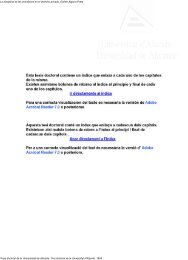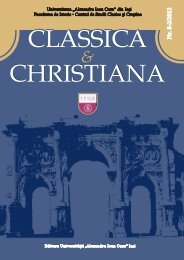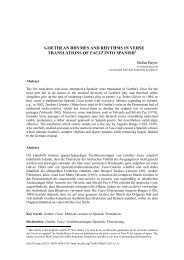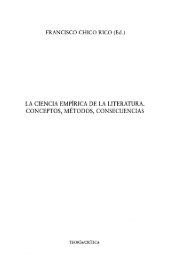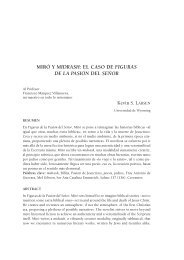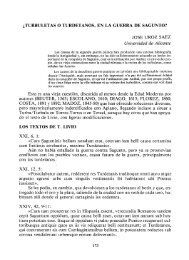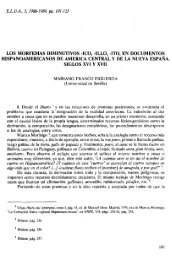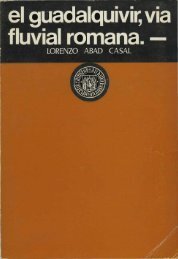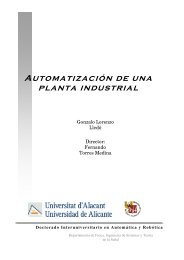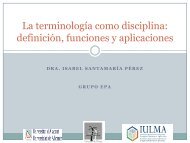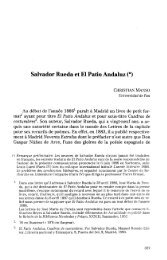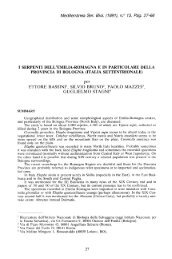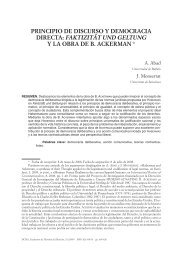Adverbs ADVERBS: - RUA
Adverbs ADVERBS: - RUA
Adverbs ADVERBS: - RUA
Create successful ePaper yourself
Turn your PDF publications into a flip-book with our unique Google optimized e-Paper software.
Manuel Palazón & Marian Aleson<br />
GRAMMAR<br />
Máster Dir. Emp. Tur,<br />
<strong>Adverbs</strong><br />
• Describe verbs, adjectives, other adverbs or even sentences: He teaches well.<br />
• They say “how”, “when”, “where”, “how often” or “to what extent”.<br />
• There are also sentence adverbs and relative adverbs (possibly and where, respectively).<br />
• From adjective to adverb:<br />
• adj. +ly: quickly.<br />
• adj. ended in consonant + y: > -ily Sleepily.<br />
• adj. ended in –ic: -ally Tragically.<br />
• adj. ended in –le: drop –e and add –y: agreeable > agreeably.<br />
• adj. ended in –e: +ly. falsely. Exceptions: wholly and truly.<br />
• adj. ended in –ly: adverb with ...manner / way. in a lively manner.<br />
• Adjectives and adverbs with the same form: best, better, big, cheap, clean, clear, close, cold, daily,<br />
dead, deep, direct, dirty, early, easy, far, fast, free, further, hard, high, hourly, inside, kindly, last,<br />
late, long, low, monthly, right, slow, straight, sure, thick, tight, weekly, well, wide, wrong, yearly...<br />
• <strong>Adverbs</strong> that can either keep the adjective form or add –ly: cheap, clean, clear, close, dear, fine,<br />
quick, quiet, thin.<br />
A.- Are the underlined words adjectives or adverbs?<br />
1) My shoes are too tight.<br />
2) I buy Think in English monthly, but Peter subscribes to it on a yearly basis.<br />
3) I couldn’t get the glass from the shelf because it was too high.<br />
4) The teacher always arrives late.<br />
5) The late director was fantastic.<br />
The walls of T2 are so thin you could hear a fly fly.<br />
<strong>ADVERBS</strong>:<br />
FREQUENCY:<br />
majority of<br />
adverbs<br />
A) SUBJECT + ADVERB + VERB + COMPLEMENTS<br />
I never catch the bus at 10:00.<br />
B) SUBJECT + AUXILIARY VERB + ADVERB + VERB + COMPL.<br />
I have always get up at 8:00<br />
C) SUBJECT + TO BE + ADVERB + COMPL.<br />
I was still asleep when my mother called me.<br />
A) <strong>ADVERBS</strong> ARE ORGANISED FOLLOWING TWO POSSIBLE STRUCTURES:<br />
Time + Manner + Place:<br />
TMP<br />
SEVERAL<br />
<strong>ADVERBS</strong><br />
Ex. Yesterday I carefully read the text at home.<br />
Manner + Place + Time:<br />
MPL<br />
Ex. I carefully read the text at home yesterday.<br />
B.- <strong>Adverbs</strong>. Rewrite the following sentences in the correct order.<br />
1) Often I this hotel stayed have in<br />
2) Never has hotel this so been crowded<br />
3) Very room executive the like much I<br />
4) Beautifully designed this complex got gardens has<br />
5) The party was welcomed yesterday<br />
1
Manuel Palazón & Marian Aleson<br />
GRAMMAR<br />
Máster Dir. Emp. Tur,<br />
Test 1.-<br />
<strong>Adverbs</strong> and adjectives<br />
1.- ….. to the beach on Mondays.<br />
a) I go never<br />
b) Never I go<br />
c) I never go<br />
d) Never go I<br />
2.- Don’t worry about Peter; … on time<br />
a) he’s always<br />
b) he always is<br />
c) always he is<br />
d) always is<br />
3.- Peter’s daughter …. been late<br />
for school.<br />
a) has never<br />
b) never has<br />
c) she’s never<br />
d) she never is<br />
4.- The tourists …. on Saturday.<br />
a) arrive often<br />
b) often arrive<br />
c) are often arrived<br />
d) often are arrived<br />
5.- The rep the names of the<br />
tourists.<br />
a) never can remember<br />
b) can never remember<br />
c) never remember<br />
d) remembers never<br />
6.- … surprised to hear the<br />
anecdote.<br />
a) Both they were<br />
b) they both were<br />
c) They were both<br />
d) Both of they were<br />
7.- The guide … to work by bus.<br />
a) always goes<br />
b) goes always<br />
c) he always goes<br />
d) he goes always<br />
8.- My guidebook has disappeared.<br />
… stolen.<br />
a) It has probable been<br />
b) Probably it has been<br />
c) It has probably been<br />
d) It probably has been<br />
9.- Have you … eaten snails?<br />
a) never<br />
b) sometimes<br />
c) sometime<br />
d) ever<br />
10.- Have you ever … London?<br />
a) stayed<br />
b) gone to<br />
c) been to<br />
d) been in<br />
11.- The boat went … as it could.<br />
a) as fast<br />
b) fastly<br />
c) fastest<br />
d) faster<br />
12.- … the names.<br />
a) I ordered carefully<br />
b) I carefully ordered<br />
c) Carefully I ordered<br />
d)I order careful<br />
13.- Do … as a guide?<br />
a) always you work<br />
b) always work you<br />
c) you always work<br />
d) you work always<br />
14.- … more than 3 hours at the<br />
beach.<br />
a) I never have stayed<br />
b) I‘ve never stayed<br />
c) I have stayed never<br />
d) Never I have stayed<br />
15.- Guadalest … in the mountains.<br />
a) picturesquely sits<br />
b) sits picturesquely<br />
c) sits picturesque<br />
d) picturesque sits<br />
16.- I … visit my aunt in Great<br />
Britain.<br />
a) hardly never<br />
b) ever hardly<br />
c) never hardly<br />
d) hardly ever<br />
17.- I … too glad to see Peter come.<br />
a) only was<br />
b) was only<br />
c) only be<br />
d) be only<br />
18.- That guide explains the route<br />
very …<br />
a) best<br />
b) good<br />
c) goodly<br />
d) well<br />
19.- … been to Glasgow?<br />
a) have you never<br />
b) you have never<br />
c) have you ever<br />
d) have ever you<br />
20.- Which one is correct?<br />
a) I like very much Indian food.<br />
b) I like Indian food very much<br />
c) Very much I like Indian food.<br />
d) I very much like Indian food.<br />
21.- … Peter today.<br />
a) I’ve seen also<br />
b) I also have seen<br />
c) I have also seen<br />
d) I too have seen.<br />
22.- I … chosen the route for the<br />
excursion.<br />
a) ‘ve careful<br />
b) ‘ve carefully<br />
c) careful have<br />
d) carefully have<br />
23.- Rooms are cleaned …<br />
a) daily<br />
b) all days<br />
c) every days<br />
d) all correct<br />
24.- The hotel … near the beach.<br />
a) conveniently is located<br />
b) is located conveniently<br />
c) conveniently is located<br />
d) is conveniently located<br />
Bibliography:<br />
Alcaraz, E. & Moody, B. (1980): Morfosintaxis inglesa para Hispanohablantes. Alcoy: Marfil<br />
Campos, M,, Lillo, A., & Pina, V.M. (2002): Grammar in Gobbets; Madrid: Aguaclara<br />
Eastwood, J. (1996): Oxford Guide to English Grammar. Oxford: Oxford University Press.<br />
Eastwood, J. (1999 1 ): Oxford Practice Grammar: Intermediate. Oxford: O.U.P.<br />
Hashemi, L. & Murphy, R. (1998): English Grammar in Use. Supplementary Exercises.<br />
Hewings, M. (1999): Advanced Grammar in Use. Cambridge: C.U.P.<br />
Cambridge: Cambridge University Press.<br />
Greembaum & Quirk (1990): Student’s Grammar of the English Language.Longman.<br />
Thomson, A. J.. & MARTINET, A.V.: A Practical English Grammar. Oxford: O.U.P.<br />
...............................: A Practical English Grammar. Exercises 1 and 2. Oxford: O.U.P.<br />
Schrampfer Azar, B. (1989): Understanding and Using English Grammar. New Jersey: Prentice Hall Regents.<br />
Swan, M.: Practical English Usage. Oxford: O.U.P.<br />
Yule, G. (2006 1 ).Oxford Practice Grammar: Advanced. Oxford: O.U.P.<br />
2



